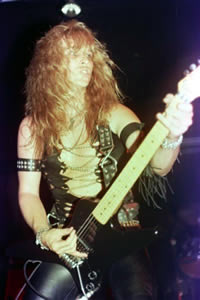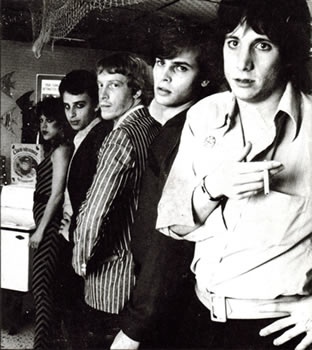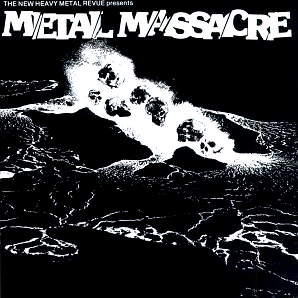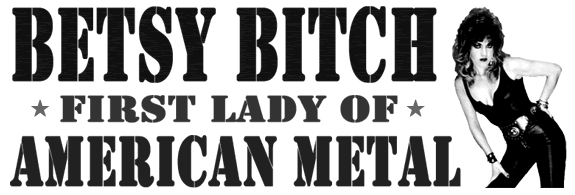![]()
by David Gasten
The following bio relates the story of the founding of Bitch and their early influences, and continues with the activities of the group from 1989 to present. At this point it is unfinished, but we hope to have it cover the entire Bitch story eventually.

The Roots of Bitch: David Carruth and Robby Settles
 |
Founding Bitch member David Carruth.
(Photo by Mike "Ozzy" Gibbens) |
A childhood friend of David's named Robby Settles moved to LA in 1979, and reconnected with David. When Dana Strum edged David out of Bad Axe the next year, David decided to start a new group with his childhood friend. So David and Robby began putting their band together in September of 1980. The two agreed that the name of the band would be Bitch, and that David would play guitar and Robby would play drums.
“[Bitch] was intended to be an all male band but I was starting to get into girl fronted bands like The Pretenders, Pearl Harbor and the Explosions, etc.,” David told the author. “Robby and I discussed trying that out but heavier. He was always up for something new and different.” They started entertaining the idea of having a female member that would be the token “bitch”, and then put ads in the musicians’ classified the Music Connection to find this female member. Robby recalls, “I think we first ran an ad for a female guitarist. We did find someone[;] I can't remember her name but she was really good. Then we put out the ads for a singer.” Their first concept was to have a male singer and female guitar player, with the idea of the lady guitarist being the “bitch”. But a response to the ad from a female vocalist named Betsy would put a different spin on things.
Betsy and The Boxboys
Betsy M. Weiss was raised in a Brigantine, New Jersey, a beachside town across the water from Atlantic City. Betsy moved to Los Angeles with her mother Lois and older sister Jane at the age of ten, and attended high school with future Bitch guitar player Jay Dean and future The Bitch is Back producer Joe Romersa. One of Betsy’s extracurricular activities in high school was singing in the school’s glee club, where she found that she had raw talent as a singer. At the same time, she fell in love with the music of Alice Cooper, Cheap Trick, The Runaways, David Bowie, Judas Priest, and Angel. Betsy put two and two together, and began thinking about becoming a singer for a rock band.
Betsy took her first steps as a rock and roll singer with a few garage
band collaborations that never left the garage, and never even made it to the
stage of having names. Her first
experience fronting a working band was with The Boxboys, who began life
as a new wave/rock band, a situation that Betsy initially enjoyed. Upon
discovering the Second Wave Ska movement that was happening in England
and realizing that practically everyone in town was doing new wave, The Boxboys
decided to reinvent themselves as LA’s representatives in the growing ska
movement. The Boxboys would become fixtures at a now-defunct reggae/mod revival
club called the ON Klub, and also played notable venues like The
Roxy and The Starwood.

The band naming themselves “The Boxboys” and having a female singer was calculated as an ironic gimmick, and dated from when the band was still playing new wave. The name was never to Betsy’s liking, although she went along with it anyway. After the band switched to playing ska, they decided to take their purposely misleading gimmick a step further. The group agreed that the entire band, including their girl singer, would dress in the suits and porkpie hats typical of the ska bands in England, and Betsy did a few shows with the band dressed like this. The concept of a group called The Boxboys with a cute girl singer who also wore boys’ clothes is a clever idea to say the least, but it was a poor fit for Betsy, who was not a tomboy at heart. The unhappy situation led to Betsy dropping out of the band and looking for opportunities elsewhere.
Betsy participated in two recording sessions with The Boxboys, which resulted in two 7” releases, a single “American Masquerade” b/w “Come See About Me” (aka Uptown Yankee Ska), and a 3-song EP called Skaletons in the Closet. The second single featured Betsy on vocals but was released after Betsy left the band. The Boxboys continued for a while with a singer named Lisa Bosch, and then disbanded. Although The Boxboys themselves did not go on to greater things, they became the idols of a ska/mod revival group who followed in their wake called The Untouchables. The Untouchables went on to become one of the most famous of the American ska bands. The band still performs live today, and considers The Boxboys to be one their greatest influences.
The now disenfranchised Betsy got a copy of the Music Connection and answered an ad for a singer, which turned out to be David Carruth’s and Robby Settles’ ad. When David requested a recorded sample of Betsy’s vocals, Betsy told him to buy The Boxboys’ single that featured her as lead vocalist, which he promptly did. Betsy was the only female singer to answer David’s and Robby’s ad, and the two started to realize that having a flamboyant lady singer as the “bitch” made a lot more sense than having a female guitar player be the “bitch” whilst competing for attention with a male vocalist. However, both Betsy and Bitch’s lady guitarist made it clear that they wanted to be the only female in the band. Liking what they saw and heard in Betsy, David and Robby decided to keep Betsy. With the addition of Kevyn Redwine on bass, the band Bitch began officially in December of 1980, with Betsy taking on the stage name and character of Betsy Bitch.
It was right around the time Bitch was started that the band would
receive the first of many close brushes with stardom. Circa November 1980, Betsy talked to a guy-friend of hers on the phone, who let her know that he decided to quit a group that he had co-founded called London
because he had this great idea for a band called Mötley Crüe.
The name of this friend was Nikki Sixx.
The punk rock-like energy that is currently endearing Bitch to the garage rock revival is not coincidental. In addition to David's interest in lady-fronted punk, new wave, and power pop groups, Robby also had a definite love for punk rock. "[Robby] loved punk. The Dictators was his favorite band at the time," David remembers.
However, most of Bitch's punk energy was not lifted directly from punk rock, but rather from the New Wave of British Heavy Metal (NWOBHM) movement, which at the time was at its height in the UK. Like the ’77 punk/new wave explosion before it, the NWOBHM started in England and then reached Los Angeles via import LP’s and 45’s, where LA-based fans began their own adjacent satellite movement. But unlike their LA punk predecessors who largely imitated their British punk heroes, the LA fans of NWOBHM took their influences and ran with them, developing a distinct identity all their own. Within a few short years, LA would be the hub of a massive and multi-faceted heavy metal movement that would dominate the musical landscape of the 1980’s.
It was David Carruth in particular who was the NWOBHM spearhead of Bitch. David would seek out whatever obscure import groups he could find and get the rest of the band excited about them. Betsy remembers David getting the other members of the group into Iron Maiden, Saxon, and Angel Witch early on. A little-known fact about the NWOBHM is that the movement bled into other countries outside of the UK, and David was also getting into non-British NWOBHM groups like Riot and Warning (from New York and France respectively). Some of the non-NWOBHM metal that David was a fan of included Michael Schenker, Gary Moore, Legs Diamond, and the pre-Love at First Sting Scorpions. David’s guitar style continued to remain rooted in the seventies heavy metal of Motörhead, Deep Purple, and Led Zeppelin, but it was his branching out and listening to the latest developments in heavy metal elsewhere in the world that allowed Bitch to be a little ahead of the curve musically in an LA music scene that was still stuck in the 1970’s.
 |
Metal Massacre I (1982), the first album ever released on Brian Slagel's Metal Blade Records and the album that introduced the world to Bitch.
|
While Brian Slagel was still an Oz Records employee, he founded the heavy metal fanzine The New Heavy Metal Revue. Brian was working on the concept of a sampler album that would tie into the fanzine and showcase underground heavy metal groups in Los Angeles. The compilation was to be called Metal Massacre. David talked with Brian about his new “Bitch” project, and Brian immediately offered the band a spot on his compilation album if they would submit a demo to him. Bitch then submitted a four-song demo containing the songs “Never Come Home,” “You're On Your Own,” “I Think We're Alone Now,” and “Live for the Whip” for inclusion in Metal Massacre, and Brian chose the gimmicky “Live for the Whip” as Track Two of the compilation.
Bitch Rising
Bitch began rehearsing and playing shows, with their first show being at The Troubador on Friday, May 1, 1981. The band shared the bill that night with Dante Fox, who would later become Great White. Word began to spread, and before long the former girl singer in boys’ clothes found herself the focus of attention to a swarm of male admirers. Betsy was proud of her womanhood and loved the attention from men, so her new role as Betsy Bitch fit her like a glove…
Note: Part 2 (covering Damnation Dalley, Be My Slave, and the PMRC scandal) and Part 3 (covering The Bitch is Back and the Betsy album) are not yet written; you can follow the story in the Bitch Discography and in the shorter bio on Bitch's official site. However, our story picks up with the A Rose By Any Other Name EP in 1989 in the Bitch Biography Part 4...
